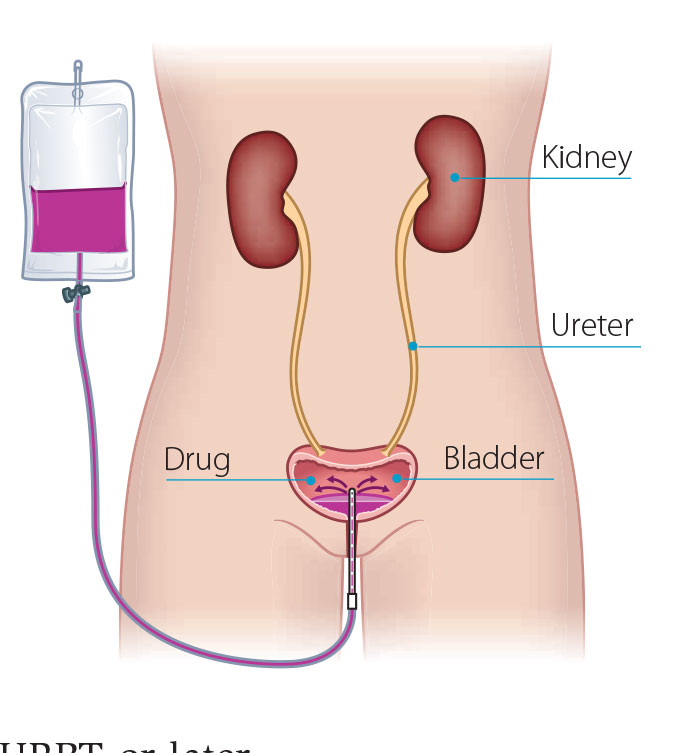Drug treatment after TURBT
Chemotherapy or sometimes immunotherapy can be given directly into your bladder to reduce the risk of the cancer coming back or spreading deeper into the bladder.
Intravesical chemotherapy (chemotherapy into your bladder)
Your doctor may decide to give you chemotherapy after your TURBT to reduce the risk of the cancer coming back. With non-muscle-invasive bladder cancer, a liquid chemotherapy drug is normally put directly into your bladder through a catheter tube. This treatment is known as intravesical chemotherapy.
You might have this treatment on the day you have the TURBT or in the hospital’s outpatient department after you have been discharged.
Questions about intravesical chemotherapy
- For the few hours before the treatment you will be advised to limit the amount of fluid you take, as once you have the chemotherapy in your bladder, you must try not to pass any urine for an hour. This gives the chemotherapy drug time to be in contact with the lining of the bladder.
- You then pass urine naturally to get rid of the drug.
- Occasionally a catheter (tube) is placed in your bladder. When the chemotherapy is placed in your bladder, the catheter will then be clamped. It will be released to drain the bladder and the catheter may be removed.
- Hardly any of the drug is absorbed into the bloodstream, so it rarely affects any other part of your body.
Examples of drugs used in intravesical chemotherapy are mitomycin-C, epirubicin, doxorubicin and gemcitabine.
You may have a single treatment or a course of treatments, depending on the risk group of your cancer.
If your doctor feels you have a low risk of the cancer coming back, you may not need any more than one treatment. If they feel you have a greater risk, they may recommend you have more intravesical chemotherapy. This is usually given once a week for 6 consecutive weeks.
You will need to take some precautions for 6 hours after treatment:
- Sit down to pass urine (water) to avoid splashing
- Wash the skin around your genitalia area with soap and water when you pass urine (water)
- Wash your hands with soap and water after going to the toilet
Drink 2 litres of water a day for 2 days
If having sex, you will need to use a condom for 48 hours after treatment to protect your partner
Intravesical chemotherapy is tolerated well by most patients. Severe
complications are rare. Possible side-effects of intravesical chemotherapy include:
- Bladder irritation/inflammation (cystitis)
- Blood in the urine
- Skin problems, such as a rash
Intravesical immunotherapy (immunotherapy into your bladder)
Immunotherapy helps your immune system to work better to fight cancer cells. BCG treatment is an intravesical (directly into your bladder) immunotherapy. While BCG is better known to some people as a vaccine used to prevent tuberculosis (TB), it is also used as a treatment for bladder cancer.
BCG can help to stop bladder cancers coming back or spreading deeper into the bladder.
Questions about intravesical immunotherapy
When BCG is in the bladder, it goes to the cancer cells. This ‘turns on’ the immune system, and the immune system will then attack the bladder cancer cells.
This treatment only works for cancer cells that are in the lining of your bladder. It does not work for cancer that has spread to your bladder muscle. BCG is usually used for carcinoma in situ and other higher-risk bladder tumours. Your doctor or nurse will give you more information if needed.
The drug is given as a liquid, which is passed into the bladder through a catheter tube that is placed in your urethra. Once you have the treatment in your bladder you must try not to pass urine for 2 hours. The treatment is usually given once a week for 6 weeks.
You will need to take some precautions for 6 hours after treatment:
- Sit down to pass urine (water) to avoid splashing
- Wash the skin around your genitalia area with soap and water when you pass urine
- Put some undiluted bleach into the toilet and leave for 15 minutes before flushing to clean the toilet
- Wash your hands with soap and water
Drink 2 litres of water a day for 2 days.
If having sex, use a condom for 7 days after treatment to protect your partner.
Side-effects are generally mild and BCG treatment is tolerated well by
most people. Side-effects are usually temporary and resolve within a
couple of days. Severe complications are rare. Possible side-effects of intravesical immunotherapy include:
- Bladder irritation/inflammation (cystitis)
- Blood in the urine
- Fever
- Feeling generally unwell
Maintenance therapy
Sometimes drug treatments are repeared and given regularly. This is known as maintenance therapy.
Talk to a Cancer Nurse

Support Line
Our Daffodil Centres


